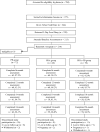The use of mHealth to deliver tailored messages reduces reported energy and fat intake
- PMID: 24434827
- PMCID: PMC5027143
- DOI: 10.1097/JCN.0000000000000120
The use of mHealth to deliver tailored messages reduces reported energy and fat intake
Abstract
Background: Evidence supports the role of feedback in reinforcing motivation for behavior change. Feedback that provides reinforcement has the potential to increase dietary self-monitoring and enhance attainment of recommended dietary intake.
Objective: The aim of this study was to examine the impact of daily feedback (DFB) messages, delivered remotely, on changes in dietary intake.
Methods: This was a secondary analysis of the Self- Monitoring And Recording using Technology (SMART) Trial, a single-center, 24-month randomized clinical trial of behavioral treatment for weight loss. Participants included 210 obese adults (mean body mass index, 34.0 kg/m²) who were randomized to either a paper diary (PD), personal digital assistant (PDA), or PDA plus daily tailored feedback messages (PDA + FB). To determine the role of daily tailored feedback in dietary intake, we compared the self-monitoring with DFB group (DFB group; n = 70) with the self-monitoring without DFB group (no-DFB group, n = 140). All participants received a standard behavioral intervention for weight loss. Self-reported changes in dietary intake were compared between the DFB and no-DFB groups and were measured at baseline and at 6, 12, 18, and 24 months. Linear mixed modeling was used to examine percentage changes in dietary intake from baseline.
Results: Compared with the no-DFB group, the DFB group achieved a larger reduction in energy (-22.8% vs -14.0%; P = .02) and saturated fat (-11.3% vs -0.5%; P = .03) intake and a trend toward a greater decrease in total fat intake (-10.4% vs -4.7%; P = .09). There were significant improvements over time in carbohydrate intake and total fat intake for both groups (P values < .05).
Conclusion: Daily tailored feedback messages designed to target energy and fat intake and delivered remotely in real time using mobile devices may play an important role in the reduction of energy and fat intake.
Conflict of interest statement
STATEMENT OF POTENTIAL CONFLICT OF INTEREST Authors have no conflicts of interest to disclose.
Figures


References
-
- Wadden TA, Butryn ML, Wilson C. Lifestyle modification for the management of obesity. Gastroenterology. 2007 May;132(6):2226–2238. - PubMed
-
- Digenio AG, Mancuso JP, Gerber RA, Dvorak RV. Comparison of methods for delivering a lifestyle modification program for obese patients: a randomized trial. Ann Intern Med. 2009 Feb 17;150(4):255–262. - PubMed
-
- Mossavar-Rahmani Y, Henry H, Rodabough R, et al. Additional self-monitoring tools in the dietary modification component of The Women’s Health Initiative. J Am Diet Assoc. 2004 Jan;104(1):76–85. - PubMed
-
- Wing RR, Phelan S. Long-term weight loss maintenance. Am J Clin Nutr. 2005 Jul;82(1 Suppl):222S–225S. - PubMed
-
- Burke LE, Warziski M, Starrett T, et al. Self-monitoring dietary intake: current and future practices. Journal of renal nutrition: the official journal of the Council on Renal Nutrition of the National Kidney Foundation. 2005 Jul;15(3):281–290. - PubMed
Publication types
MeSH terms
Substances
Grants and funding
LinkOut - more resources
Full Text Sources
Medical

